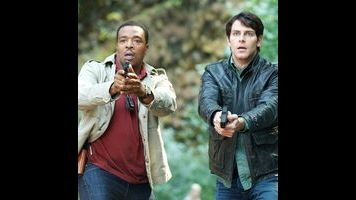E.T.A. Hoffmann’s story “Der Sandmann” is a frightening inversion of the classic folklore character that brings good dreams. In the German tale, Sandman is evil, stealing children’s eyeballs to feed his family in the moon. Other than the novella that inspired The Nutcracker, it’s Hoffmann’s most notable achievement, a work of romantic horror that explores post-traumatic stress, obsession, and automatons. Don’t get me wrong, I love Neil Gaiman’s Sandman stories, but the definitive version of an evil Sandman belongs to Hoffmann.
Unfortunately, Grimm’s tendency to cherry-pick folktale elements doesn’t work as well with Hofmman’s story. Strip-mining for a few scary features, instead of using the story as a strong foundation, or as the launching point for a departure in narrative style, yields a basic case of the week plot with some scary elements, but with a disappointing lack of ambition. That’s par for the course with Grimm, but when using such ripe source material, it makes the unremarkable goals of the show much more underwhelming.
“Mr. Sandman” takes a lot of unnecessary legwork to even establish a scenario in which Nick and Hank would enter the case. “Andre” the black fly Wesen spews out parasitic worms into his victim’s eyes, which slowly grow and eat away the eyes and kill the victim. But before that, the creature feeds on the victim’s tears. That act doesn’t bring in Nick and Hank to investigate, which is why the first woman has to die via bookcase, making it a homicide possibility, and linking all subsequent similar cases to our heroes.
A few interviews and a trip to the Magic Winnebago later, Nick knows what he’s dealing with, a “Ginnemuroo Shuntae” (I’m totally guessing on the spelling, and half an hour searching didn’t turn up any help) from Africa, compulsively seeking out grief support groups, or any other place with people likely to be crying profusely. It’s a creepy setup, but creating the Sandman as an insect Wesen from Kenya that blows parasitic worms into the eyes of its victims, then feeds off their tears like an “opium addict,” twists the foundational inspiration so far that it becomes unrecognizable. It abandons source material fit for modern adaptation, and focuses solely on the eye-stealing aspect of the story, completely ignoring the unsettling automaton.
Since Grimm is a genre television show, I tend to overlook the poor CGI quality as indicative of the show’s budget, which isn’t extravagant. But tonight in particular was laughable, turning a frightening and uncomfortable concept, and giving it a poorly rendered face that looked bizarre and funny instead of scary. The fly Wesen may attack with a lot of creepy-crawlies that grow in disgustingly violent fashion, but he looks so fake and digital that he isn’t credibly scary.
At the house for the final showdown, Grimm faces an interesting decision: let Nick sit this one out in favor of a Hank/Monroe team-up, or explore the possibilities of Nick’s dramatically heightened hearing. The show chooses the latter, which is the weaker, less comedic possibility that doesn’t build something more compelling going forward. Building a better relationship between two now-capable cohorts of Nick is more important than improved hearing for the Grimm, a new trait that may never be revisited.
As a case of the week, I wanted to overlook this episode’s shortcomings because I really like the story that lends the epigraph, but Grimm doesn’t do right by that inspiration. And though watching Nick stumble blindly through an attic to pursue the Wesen before using his super-hearing works in a tense, low-budget Silence Of The Lambs sort of way, it doesn’t make up for the narrative shortcuts that stunt the creative growth the show has been going through in the middle of this season.
Rosalee and Juliette haven’t shared much screen time together, and unless I’m mistaken tonight is the first time they’ve ever had a scene alone, just the two of them. Juliette’s side effects continue, now including a wispy apparition that only she can see. It turns into Nick, but there’s still no sign that this will get an explanation soon. Renard meanwhile, has his own, more vivid vision, where Juliette decays until she’s haggard and deformed like a hexenbiest. So they’re both experiencing residual effects of Rosalee’s treatment. What those visions are, or what they mean for their hopefully continued improvement remains to be seen.
And Adalind continues her baby journey, revealing to one of her mother’s old friends that she’s pregnant, by either Renard or his brother. That makes the child of royal blood—though only a quarter if it’s Renard’s, as opposed to half if it’s his brother’s—and apparently a valuable asset. Just what kind of value it carries, or what Adalind plans to do with that vague leverage, remains to be seen. But she’s got a card that waits to be played, perhaps something to set Renard and his brother against each other over something more immediate than a quest for more keys, and that would be a good avenue to explore, especially given the questions raised around Monroe’s dinner table about Renard’s allegiances plans for his partnership with Nick.
Stray observations:
- That dinner scene with Rosalee, Monroe, Hank, and Nick needs to happen more often. Grimm could use a My Dinner With Andre episode confined to a meal like that. It would do wonders for characterization. I know it won’t happen, but that scene really clicked how much that group has become a tight-knit team, though not as well-developed as they could be.
- I won’t spoil it for anyone who doesn’t watch the next episode previews, but my word, does that episode look like a doozy.
- “What kind of spice shop are you running?”—Sometime, somewhere, somehow, Grimm either needs to bring Juliette into the loop without putting her into a coma to retcon that explanation away, or get rid of her entirely.
- I can’t be the only one who thought of Fruit Ninja when that final scene happened.

